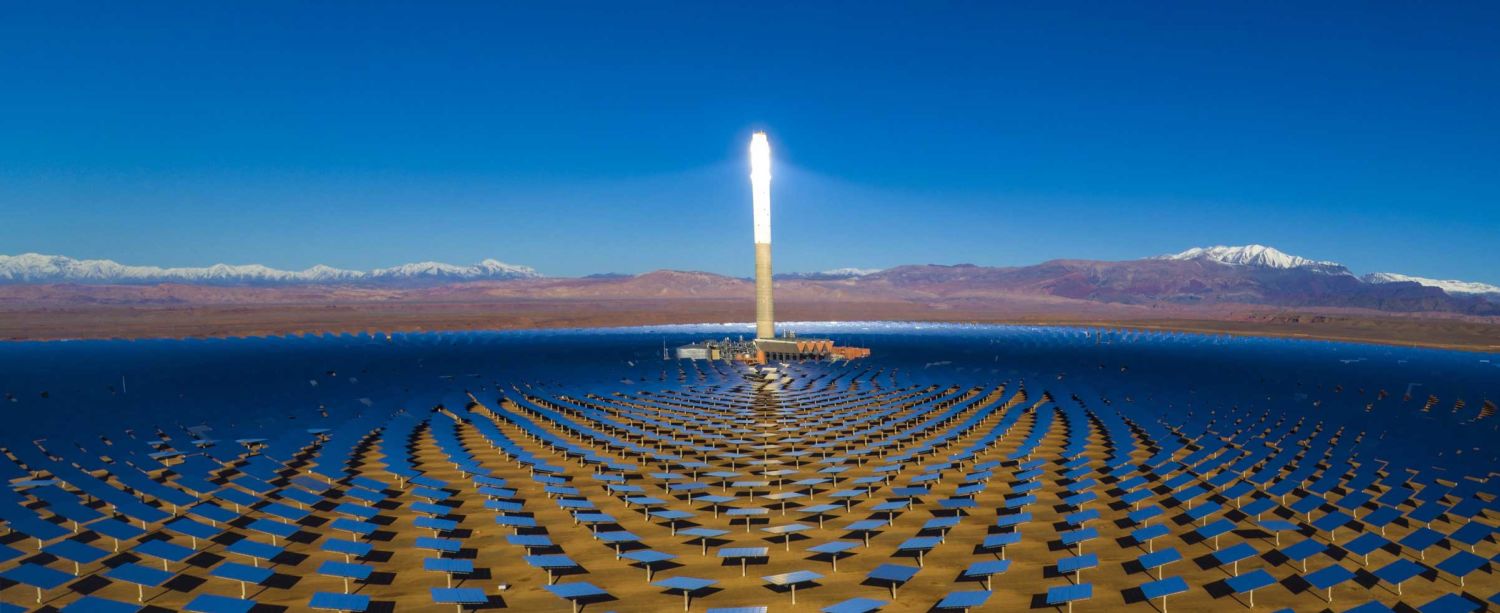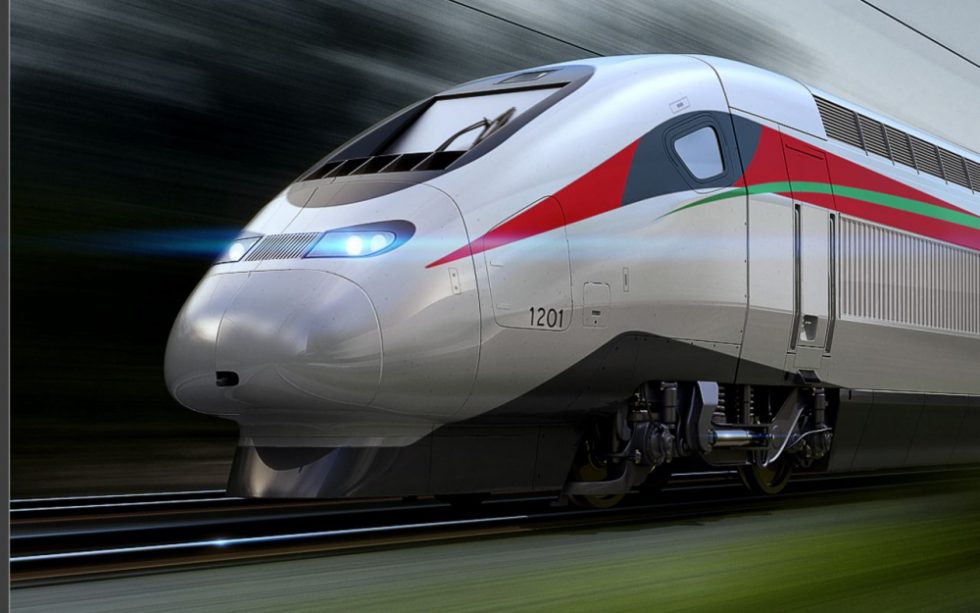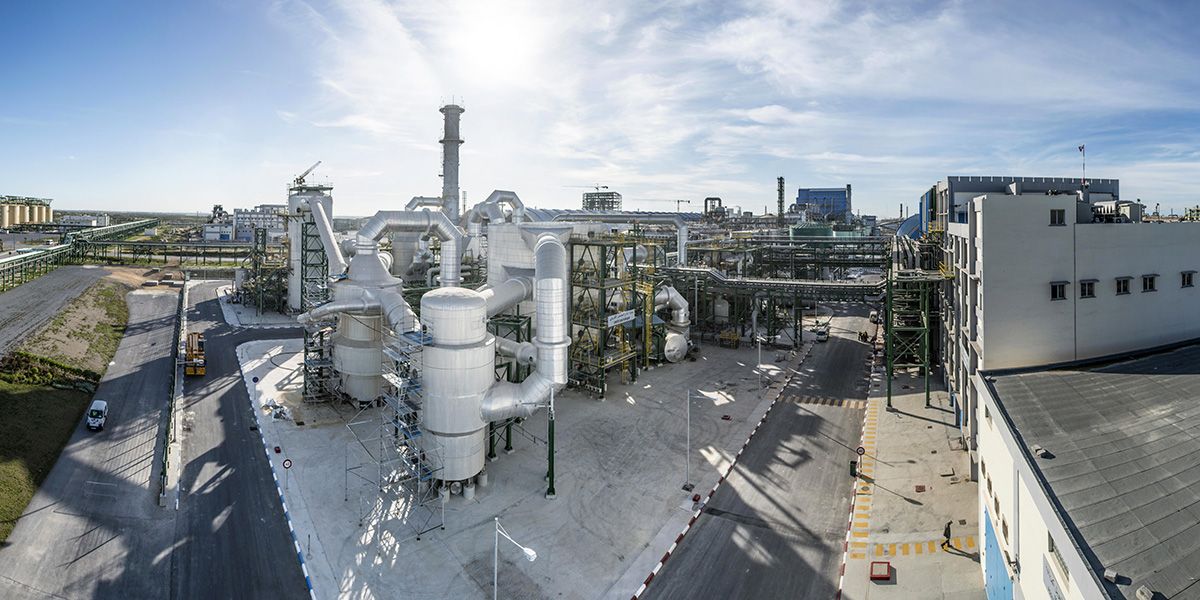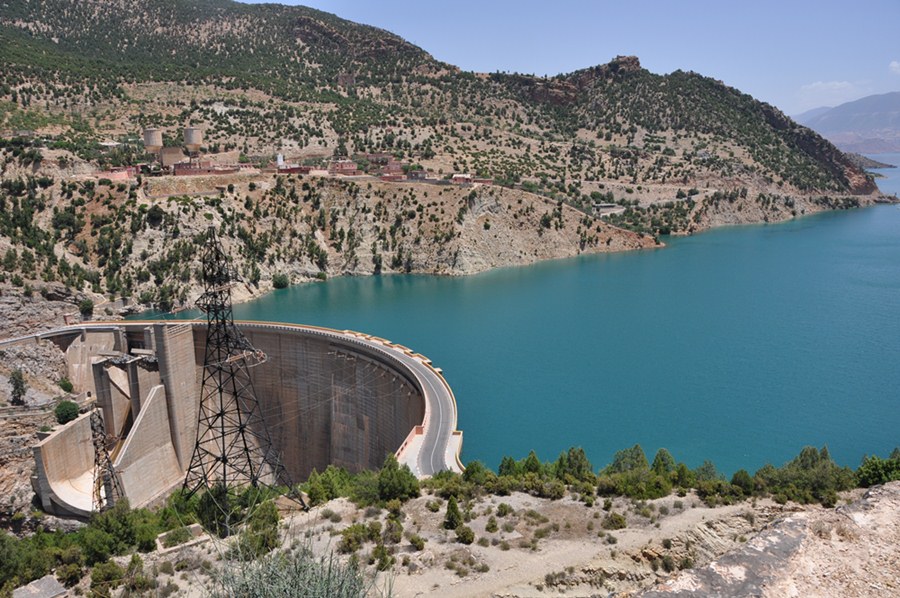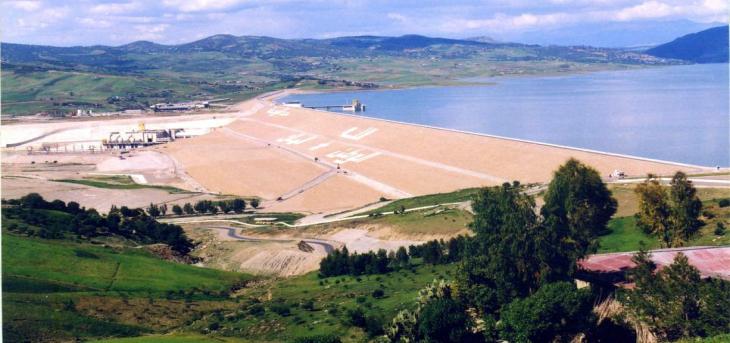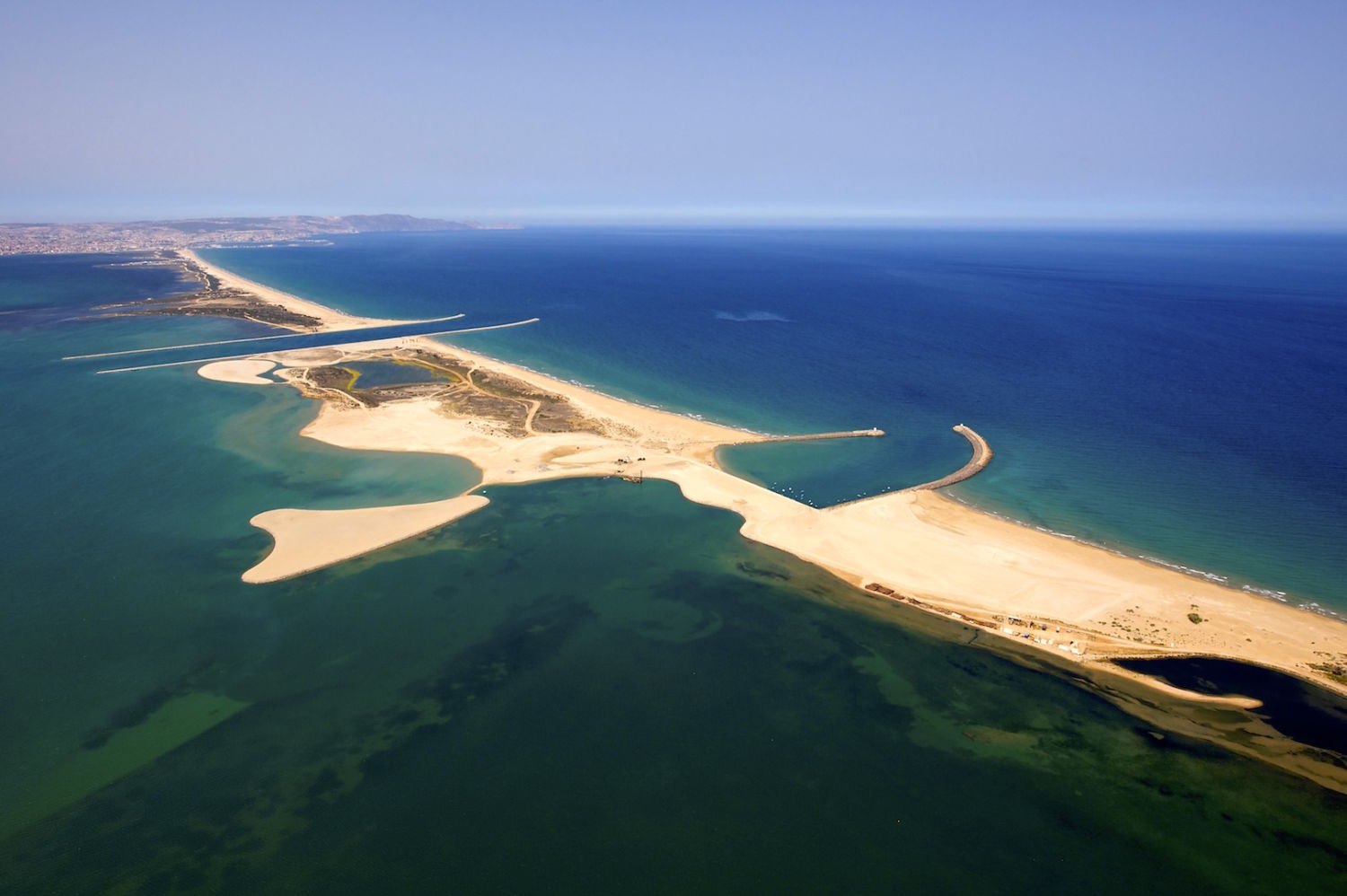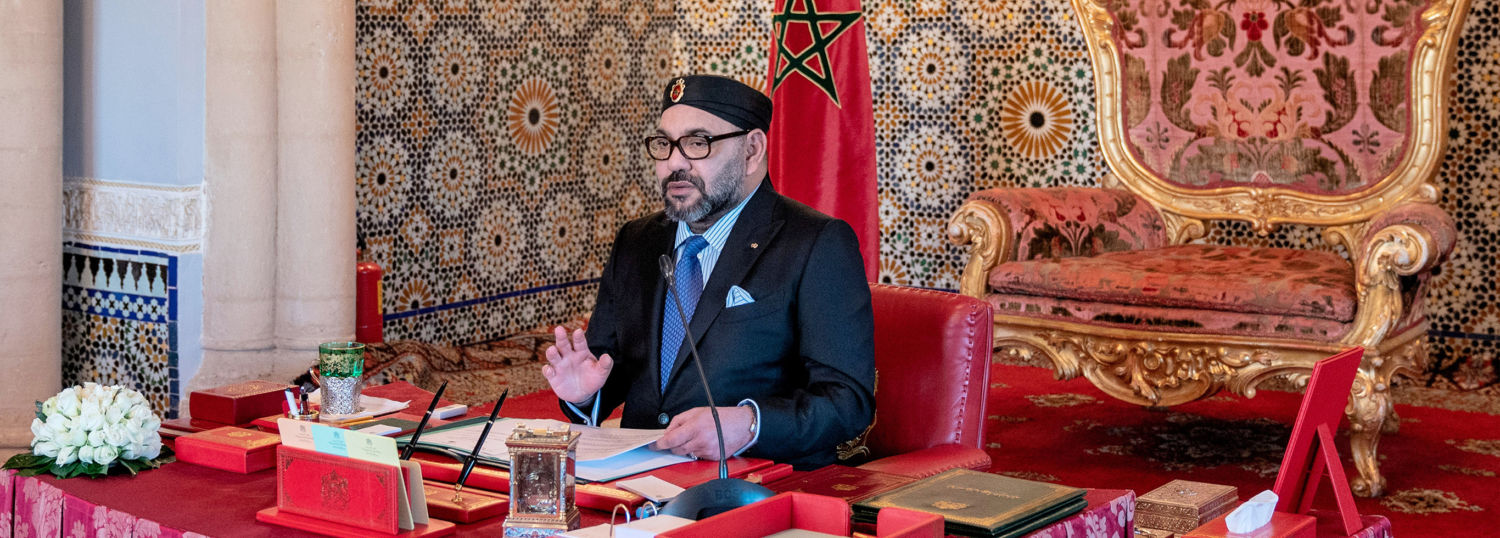Bilateral cooperation
Bilateral cooperation between the Kingdom of Morocco and its foreign partners has been characterized by significant dynamism, thanks to the conclusion of several cooperation agreements and programs on migration issues in general, in a context marked by significant migratory flows.
Cooperation with Germany
Cooperation with Germany is focused on the following five projects:
PROJECT 1 RECOMING PERIOD: 2015-2017
“Strengthening the capacities of Moroccan local authorities in the management of migratory flows”, funded by the Federal Ministry for Economic Cooperation and Development
Goals :
-Strengthen the capacities of local communities in Morocco in the management of migratory flows (regularized migrants and refugees).
-Transmit knowledge and experiences in relation to the social, economic and cultural integration of migrants in order to avoid conflicts at local level.
-Make concrete improvements for the local populations.
Partners
-MCMREAM: Leader.
-Department of the Interior: Member of the steering committee
-GIZ: Implementation of the project
+10 selected municipalities, local administrations, local associations and the private sector.
State of play
– Capacity diagnostic mission in the ten pre-identified communities,
– Meeting of the steering committee on 22/1/2016,
– Presentation of the main results of the diagnostic mission of
capacities in the ten pre-identified communities;
– Training of municipal actors from the 10 municipalities on management
migratory flows,
– Organization of the first version of I ’Integration Strategy Group
In a tripartite framework:
1. Berlin in January 2016
2. Istanbul in June 2016,
3. Rabat in November 2016
– Organization of the second version of the program: Integration
Strategy Group in a bilateral framework: Morocco / Germany:
1. First mission to Berlin in April 2017,
2. Second mission to Frankfort in July 2017
– Organization of leadership training: three sessions:
1. 1 st session in Rabat in February 2017 (under preparation),
2. 2nd session in Berlin in March 2017,
3. 3 rd session in May 2017 in Rabat
– Support for the organization of the migrant week 2016-2017. in December of each year
PROJECT 2 RECOSA (COMPLEMENTARY TO PROJECT1) PROPOSED PERIOD: 2016-2019
“Improving the living conditions of migrants and disadvantaged population groups at the municipal level”, funded by the Federal Ministry for Economic Cooperation and Development
Partners
-MCMREAM: Leader
-Department of the Interior: Member of the steering committee -GIZ: Implementation of the Project
State of play
Based on three main objectives:
1. improving governance of migration at international and national level (national, regional and municipal)
– At the national, regional and municipal level with the right objective
horizontal and vertical coordination allowing the territorialization of
SNIA and SMRE.
– At an international level :
Coordination for the co-presidency of the GFMG,
Promotion of triangular cooperation
2. training:
– Capacity building of MCMREAM staff in the area of migration policies,
– Capacity building of civil society,
– Strengthening of decentralized services
– Reinforcement of migrants
3. Facilitation of economic, social and cultural integration
Organization on March 16 and 17, 2017 of a strategic planning workshop for the REC project (Recoming and Recosa)
PROJECT 3 PROPOSED PERIOD: 2016- MAY 2017
“Moroccan-German Partnership for Asylum and International Refugee Protection”, funded by the Federal Ministry of Foreign Affairs.
Goal :
-Support national actors in the development and implementation of a modern and global asylum system, in line with international and European standards.
Partners
-MCMREAM: Leader
-MAEC: Member of the steering committee -GIZ: Implementation of the project
State of play
Meeting with the GIZ team: work on the integration of refugees pending the promulgation of the law,
Capacity building of civil society
Support for the organization of the International Refugee Day June 20, 2016.
PROPOSED PROJECT 4
Promotion of triangular cooperation: Morocco / Southern countries / Germany.
Project whose main objective is the encouragement of German MREs carrying projects to invest and contribute to the economic development of Morocco.
State of play
– Waiting to start
– Meeting with the GIZ team and the representative of the German chamber of commerce in Casablanca
PROJECT 5
Promotion of productive investments by German MREs Projects funded by Germany are managed and coordinated by the German Cooperation Agency GIZ, which has an office in Rabat and which monitors and implements the actions selected.
Cooperation with Belgium
As part of the 2016-2020 Moroccan-Belgian cooperation program, implemented in close collaboration with the Belgian development agency “Enabel”, the Migration component is divided into two components:
a) National Strategy Support Project for MREs “Maghrib Belgium Impulse”
The Support Project for the implementation of the National Strategy for Moroccans Living Abroad aims to mobilize and provide individual support to MRE project leaders in Belgium and Morocco for the creation and marketing of their businesses in Morocco, and the establishment of an MRE ecosystem of Belgian entrepreneurs in Morocco and Belgium. Called “Maghrib Belgium Impulse” (MBI), the project will last 3 years (between 2017 and 2020) including six months of preparation, two years of implementation, and six months of capitalization and closure. Following MEDMA II, implemented between July 2012 and June 2015, within the framework of the indicative Moroccan-Belgian Cooperation Program 2 010-2013, “Maghrib Belgium Impulse” will have a budget of 1.25 million euros, and promote productive investments in the green economy, and the social and solidarity economy.
MBI will be implemented within the framework of a consortium led by the CGEM as a Moroccan partner and by a Belgian partner which will soon be selected.
b) Project to support the implementation of the National Immigration and Asylum Strategy “AMUDDU”
The project to support the implementation of the SNIA “Amuddu” aims to ensure the access of migrants and refugees to existing vocational guidance and training schemes, to improve their access to support schemes for self-employment and the job market and to stimulate the joint action of structures working in the field of economic integration of migrants. Amuddu will be implemented in partnership with ANAPEC and Entraide Nationale. With a budget of 4.6 million euros, the project will last four years (between 2016 and 2020), including six months of preparation, three years of project implementation and six months of capitalization and closure.
The specific agreement of the Moroccan-Belgian program to support the management of the migration theme was signed on March 15, 2018 by the Minister Delegate in charge of Moroccans residing abroad and in Migration Affairs, the Minister of Economy and Finance and the Ambassador of Belgium to Morocco. This date signals the effective start of the implementation of the two Moroccan-Belgian cooperation projects “Amuddu” and “Maghrib Belgium Impulse”.
Moroccan-Spanish cooperation
Morocco and Spain maintain strategic and exemplary relations on all levels: political, economic, cultural and social, reflecting the common values of democracy, good neighborliness and mutual respect.
Since the signing in 1991 of the Treaty of Friendship, Good Neighborliness and Cooperation, the two countries have shown an unwavering commitment to move forward in their strategic, strong and diverse partnership, in several areas of common interest. .
The political aspect is of particular importance between Morocco and Spain. The two countries are strategic allies in a very sensitive area and geopolitical context, requiring concertation and permanent dialogue to face the challenges facing the Mediterranean region, including those relating to migration. The Moroccan-Spanish relations in terms of migration are quite old due to the existence of a large community of Moroccan origin in Spain, which has nearly 759,999 people (*), and the shared concern at the level of management of migration being, both countries, belonging to the Mediterranean area, marked by significant flows of migration, especially from sub-Saharan Africa, which pose major security challenges related to the control of borders.
MOROCCAN-SPANISH FORUM ON IMMIGRATION AND INTEGRATION
In this context, Morocco and Spain are effectively managing the “Marhaba” transit operation through the Strait of Gibraltar, which allows a flow of more than 5 million Moroccans residing abroad to transit in both directions and under the best conditions. This operation, which has become a model at the global level, symbolizes the level of cooperation and partnership developed between the two countries and the perfect coordination between all stakeholders. During the summer season of 2017, 2,789,981 people returned to Morocco, an increase of 5.89% compared to 2016.
Source : Permanent Observatory of Immigration (General Secretariat of Immigration and Emigration – Madrid).
Thus, the Ministry Delegate in charge of Moroccans Living Abroad and the General Secretariat of Emigration and Immigration, have set up a forum for exchange and consultation on migration-related issues, called the “Moroccan-Spanish Forum on Immigration and Integration”.
The first edition of this Forum was jointly organized on 19-20 November 2015 in Madrid. The organization of this forum provided an opportunity to establish a permanent framework for dialogue on various migration-related issues, including integration aspects. In addition, the Moroccan-Spanish coordination aims to further strengthen certain common initiatives related to immigration, such as the implementation of the strategic project “Living together without discrimination”, which is based on Human Rights and gender perspective, building on the cultural dimension as a vehicle for integration and living together. These initiatives and programmes contribute to the strengthening of public policies aimed at preventing and raising awareness among all stakeholders and populations on the issue of diversity and respect for the migrant population on the basis of protecting migrant’s human rights and promoting living together.
In this regard, Morocco and Spain are aware of the importance of promoting diversity and cohesiveness between two cultures through clear and responsible support, and avoiding the unacceptable consequences of rejection, particularly against young people. Abandoned to themselves, young people may encounter narratives that fuels hatred and increases the risk of blunders in an environment affected by the rise of xenophobia and extremism of all kinds.
In this sense, the Ministry Delegate in charge of Moroccans Living Abroad and the General Secretariat of Emigration and Immigration in Spain has organized the 2nd edition of the Moroccan-Spanish Forum on 20 and 21 March 2018 in Rabat, on the theme: “Living together”, in order to better understand and analyze in depth this important topic.
The organization of this Forum, which brings together a plethora of senior officials, diplomats, university professors, experts and civil society actors, testifies to the interest shown by both countries in migration phenomenon in all its dimensions, and the willingness shown to strengthen the framework of partnership and exemplary cooperation between the Kingdom of Morocco and the Kingdom of Spain.
• Objectives of the forum
– Study existing good practices in terms of cultural diversity and Living Together as levers for integration and respect for migrants’ rights;
– Open a debate with Moroccan and Spanish experts, researchers and members of civil society in order to formulate concrete proposals on the implementation of the “Living Together” project;
– Draw up a roadmap to consolidate Moroccan-Spanish cooperation in the field of migrant integration;
– Build collaboration mechanisms and initiate forums and influence groups on the issue of “Living Together”;
– Identify concrete actions to be implemented to promote “Living together”.
• Forum focus:
– Session 1: “Living Together”: for a shared responsibility and Citizenship values.
– Session 2: Moroccan and Spanish communities: What challenges for integration!
– Session 3: Moroccan and Spanish skills abroad: What contribution for both countries?
– Session 4: Migration policies: what common challenges
PROJECT « LIVING TOGHETHER »
The project: “Living Together” was set up in December 2016 within the framework of the EU Trust Fund, according to an approach based on human rights and gender perspective. The project duration is over 3 years from 2017 to 2020 with a budget of €5,500,000. The main objective of this project is to strengthen public mechanisms and policies to cope with racism and xenophobia.
Partners :
• Ministry Delegate in charge of MRA ;
• CNDH ;
• DIDH
• Secretariat of State for Migration through the Spanish Observatory on Racism and Xenophobia);
• The Spanish Agency for International Development Cooperation;
• The International and Ibero-American Foundation for Public Administration and Policy;
• Delegation of the European Union (Observer);
• Sectoral Ministries (Interior; foreign Affairs; Health; Human Rights; Education; Justice, Solidarity etc.);
• Associations and media.
Objectives :
• Review of standards and regulations and development of proposals relating to racial and/or ethnic discrimination against the immigrant population;
• Improvement of independent mechanisms for identifying and collecting human rights complaints and racist or xenophobic incidents against the migrant population;
• Strengthening the skills of public administrations: social assistance and health, the educational community, justice, law enforcement in preventing racism and xenophobia;
• Strengthening the skills of civil society organizations in preventing racist and/or xenophobic incidents against the migrant population;
• Awareness-raising and communication aimed at preventing racism and xenophobia against the migrant population.
Framework for cooperation in the field of migration:
In accordance with the commitments made at the 1st edition of the Moroccan-Spanish Forum on Migration and Integration, which took place in November 2015 in Madrid, the meeting of the Joint Monitoring Committee was held on 19-20 December in Madrid.
Indeed, the Spanish side presented the outlines of a new cooperation project called “Masar مسار” which included various projects for the years 2017-2018, with funding from the Spanish international cooperation agency AECID.
• Project “Technical capacity building for migration management: integration and asylum, with a human rights protection approach”
The project “Technical Capacity Building for Migration Management: Integration and Asylum” is based on a solid and fruitful cooperation between the Kingdom of Morocco and the Kingdom of Spain in the field of migration.
The main objective of this project is to support the process of the national migration and asylum strategy, as well as the strategy for the benefit of Moroccans living in Spain. Funded by AECID under the “MASAR” programme.
This project is based on the following principles:
– Principle of ownership: the Moroccan authorities will be the main actors of the project;
-A strong human rights approach;
-Good governance: migration policy is a multidisciplinary field in which harmonious and appropriate management can benefit the migrant and the host society;
-Promotion of social cohesion through the principle of “living together”: the integration of migrants contributes to strengthening social cohesion;
-Strengthening the role of the Moroccan diaspora as an important lever between Moroccan and Spanish societies and as an essential actor in development.
COOPERATION WITH THE THREE CULTURES FOUNDATION
Cooperation between the Ministry and the Foundation of the Three Cultures of the Mediterranean in Seville dates back to 2010.
Indeed, this cooperation has enabled both parties to plan and implement a joint annual programme, which includes various areas such as culture, integration, teaching Arabic and Spanish to Moroccans residing in Spain, communication and awareness raising on the importance of the theme of “Living Together” in coexistence and good integration.
In the margins of the second edition of the Moroccan-Spanish Forum, the two parties signed a cooperation agreement on 20 March 2018 in Rabat, with the same objective of better facilitating the integration of Moroccans residing in Spain, particularly those living in Andalusia.
MOROCCO-AFRICA COOPERATION
REMINDER OF THE IMPORTANCE OF SOUTH SOUTH COOPERATION
South-South cooperation is a new form of aid architecture rather distant from
traditional “North-South” model. Civil society organizations play an important role
in strengthening South-South cooperation.
It aims to respect the principle of non-interference in internal affairs, equality between
development partners and respect for their independence, their sovereignty
national, their diversity and cultural identity, and local content. She plays a role
important in international development cooperation and usefully complements the
North-South cooperation.
It can be defined as an exchange of knowledge and resources in the fields
political, economic, social, cultural, environmental or technical between
governments, organizations and individuals of developing nations. She may be
implemented on a bilateral, regional, sub-regional or inter-regional level and may concern
two or more developing countries. It is based on the achievement of approved objectives
internationally in terms of development, including in particular the Objectives of the
Millennium Development Goals, aims to give more weight to developing countries and to
strengthen their bargaining power during multilateral talks. In addition, it allows
developing countries to promote their autonomy and strengthen their ties
economic.
ACTORS PARTICIPATING IN THE PROCESS
1. United Nations
In 1978, the United Nations General Assembly established the UNDP Special South-South Cooperation Unit. Hosted by UNDP, the primary role of this Special Unit is to promote, coordinate and support South-South and triangular cooperation at the global level. Several other United Nations bodies, such as the ILO, ECOSOC, UNDP, the The United Nations Development Cooperation Forum or the World Bank actively encourage and contribute to South-South cooperation.
2. Civil society organizations:
Civil society organizations are also involved in the implementation of South-South cooperation. Many unions have
integrated South-South cooperation and triangular cooperation in their development programs.
MOROCCAN POLICY TOWARDS AFRICA
Extract from the Speech from the Throne of July 30, 2004 by His Majesty King Mohammed VI
“With equal determination, We want the African Continent to remain at the heart of our foreign policy, making sure to strengthen our relations with all of the brother African countries, in particular with the least developed among them, to bring about success. “NEPAD initiative, and to participate in UN operations for the maintenance of peace and the preservation of security and stability in the Sahel region and throughout our African continent”.
Extract from the speech of November 6, 2016 in Dakar, the occasion of the 41st anniversary of the Green March of His Majesty King Mohammed VI
“This speech, delivered from this welcoming land, reflects all the interest we have in our continent. Morocco’s African policy will not be limited to West and Central Africa. Rather, we will ensure that it is continental in scope, and that it encompasses all regions of Africa. It is in this context that We made visits to Rwanda and Tanzania, despite the fact that relations with the East African States were not sufficient, not through negligence or omission, but for objective reasons such as language, geographic distance and differences in historical heritage. Driven by a shared desire with the strong leaderships of these states, we have decided to impart a new dynamic to economic and political relations between our countries, taking into account the political weight that this region represents and the economic potentials and strategic assets including she disposes “
Aware of the deep roots of its African membership, Morocco has embarked, since its independence, on the path of strengthening its historical relations with African countries. Moroccan foreign policy was marked, from the start, by Morocco’s resolute and united support for the struggle to liberate African countries from the colonial yoke and by the consolidation of African unity, which was particularly illustrated by the creation of the Organization of African Unity of which Morocco is one of the founders.
Moroccan diplomatic action has set itself the strategic objective of raising cooperation with African countries to the level of a real, active and united partnership. It is in this perspective that the multiple Royal Visits made by His Majesty King Mohammed VI, since his enthronement, to many African countries, have created a new dynamic in relations with these brotherly countries and have given a strong impetus to the south-south cooperation of Morocco with its African space.
These Royal visits punctuated a series of cooperation agreements in the fields of economic, technical, social, cultural and human development such as the fight against poverty and disease, agriculture and agrifood, fisheries, education and training, water and irrigation management, basic infrastructure and urban planning, information technology, and financial management and banks
MOROCCO-AFRICA COOPERATION
It was not until the 1970s that joint commissions were created to organize and manage bilateral cooperation in all areas covered by agreements, conventions and protocols. In order to breathe new life into cooperation, Morocco and African countries have opted for the creation and reactivation of joint committees to consolidate the legal base. These committees create the favorable climate for periodic bilateral consultations, increased trade. trade and investment, strengthening cooperation and exchanging experiences in the technical, cultural, social and human fields.
Between 1973 and 1987, sixty-three cooperation agreements were signed between Morocco and 17 African countries: Ivory Coast, Cameroon, Senegal, Zaire, Gabon, Nigeria, Guinea, Equatorial Guinea, Comoros, CAR, Togo, Chad , Mali, Gambia, Cape Verde, Liberia and Niger.
These agreements relate to the cultural, scientific and technical, commercial, air transport, maritime transport, postal and telecommunications, financial, merchant marine, tourism, investment, agriculture, civil service public, health, roads and railways, vocational training and housing.
Since 1996, the marked increase in the creation of joint commissions has contributed to the strengthening of the ties of cooperation between Morocco and its African space. This cooperation is currently governed by a legal framework comprising some 478 Agreements, Conventions and Protocols. Its implementation is ensured by mixed commissions. Institutional mechanisms, such as the Moroccan Agency for International Cooperation (AMCI), are also set up to give a strong impetus to this cooperation.
In addition to bilateral actions, Morocco remains very active in terms of African regional organizations, in particular with regional economic communities (RECs) with which it aims to strengthen ties to increase and diversify trade, technical and investment exchanges and strengthen cooperation with African regional groups
Morocco continues to put forward development issues for Africa, particularly the least developed African countries, by organizing meetings in Morocco on priority issues for Africa.
In addition, Morocco spares no effort to defend the interests of Africa with other countries and regional groupings, in particular within the framework of dialogues between Africa and the rest of the world and within international organizations. Moroccan diplomacy has always worked with the aim of placing the question of the development of the African continent at the center of the concerns of the international community, in particular within the bodies of the UN and its specialized agencies such as the launch of the initiative called the African Alliance for Migration and Development, during the work of the high-level dialogue on migration organized by IOM on October 3, 2013 in New York.
COOPERATION WITH AFRICA IN THE AREA OF MIGRATION AND DEVELOPMENT MANAGEMENT
History of Moroccan migration in Africa
-A very old migration which dates from the 19th century: Senegal and Côte d’Ivoire with some exceptions the other sub-Saharan countries,
-The new wave of Moroccan migrants is mainly linked to: Mixed marriages and students,
-The first activity is commerce, international civil servants and businessmen.
TERMS OF COOPERATION
-Depending on the strong presence of MRA in a country of residence, our actions aim to preserve the rights of MRA and their integration in this country, operation also valid for foreigners residing in Morocco: principle of reciprocity
-A request emanating from a country which wishes a transfer and exchange of experiences as regards migration policies within the framework of the South -South or triangular cooperation.
The Ministry by its expertise and know-how in the management of migration policies, is increasingly sought by African and Southern countries, friends and brothers of Morocco. To this end, several cooperation agreements (5) in the field of migration policy management have been signed and in the process of being implemented, others (7) awaiting signature.
Agreements finalized awaiting signature
– Mali
– Gabon
– Chad
– Burkina Faso
– Ground floor
– Mauritania
– Mexico
– Turkey
The Minister welcomed several Ministers and officials from partner countries wishing to strengthen their cooperation with our country, among them:
04- 01- 2018: Meeting with Minister Pia KJAERSGAARD, Head of the Parliament of the Kingdom of Denmark;
12-01-2018: Meeting with Mr. Jose Ignacio Landaluce Calleja, Mayor of Algiersiras and head of the Foreign Affairs Committee of the Spanish Ausate;
2018-02-28: Meeting with Mrs. Erika FERRERE, Ambassador of the Kingdom of Sweden;
2018-02-28: Meeting with Madame Désirée BONIS, Ambassador of the Kingdom of the Netherlands;
19 – 03 – 2018: Meeting with Mr. Tim COLE, Emissary of the United Kingdom in charge of migration;
20-03-2018: Meeting with Mr. Kai MYKKANEN, Minister of the Interior of the Republic of Finland;
26 – 03 – 2018: Meeting with Mrs. Inger STOJBERG, Minister for Migration and Integration of the Kingdom of Denmark;
27 – 03 – 2018: Meeting with Mr. Philippe COURARD, President of the Parliament of the Belgian Wallonia-Brussels Region;
07 – 04 – 2018: Meeting with Mr. Siegfried Bracke, President of the Parliament of the Kingdom of Belgium;
01 – 06 – 2018: Meeting with Mr. Jan Peumans, President of the Flemish Belgian parliament;
01 – 10 – 2018: Meeting with Mrs. María del Consuelo RumíIbáñez, Secretary of State for Immigration and Emigration of the Kingdom of Spain, accompanied by the Ambassador and a high-level delegation;
On the sidelines of the 11th edition of the Global Forum on Migration and Development (#GFMD), organized in Marrakech from December 5 to 7, 2018, the Minister received in audience several Ministers and senior officials from a number of partner countries. It is :
H.E. Yaya Sangare, Minister of Malians Abroad and African Integration;
H.E. EbrimaMballow, Minister of the Interior of The Gambia;
H.E. EssamAwadMetwally, Secretary of State for Sudanese Affairs working abroad;
H.E. Dorcas Makgato, Minister of Nationality, Immigration and Gender Issues of Botswana;
H.E. Nasser bin Thani Al Hamli Minister of Human Resources and Emiratization;
H.E. Ahmed Hussen, Minister of Immigration, Refugees and Citizenship of the Government of Canada;
H.E. Yousef bin Mohamed Al Othman Fakhroo, Minister of Administrative Development, Labor and Social Affairs of Qatar.
During these hearings, organized in the convention center of the Palmeraie, place of the conference, the discussions focused on the challenges of managing migratory flows and which face several regions of the world because of various problems including economic, political and those related to climate change. All ministers unanimously praised the pioneering and leading role of the Kingdom of Morocco in the field of Migration Affairs under the leadership of His Majesty King Mohammed VI may God assist him. The implementation of a immigration and asylum policy, humanistic and respecting the essential rights of migrants, has enabled Morocco to position itself as a pioneer and innovative country. Then, the Minister invited his counterparts to strengthen cooperation and partnership relations between Morocco and its respective countries in a spirit of win-win exchange and to increase visits on both sides in order to pool everyone’s efforts in a spirit of shared responsibility. Finally, several invitations were sent to Mr. Benatiq to make working visits, notably to Mali, United Arab Emirates, Canada, Qatar and Sudan.
Address
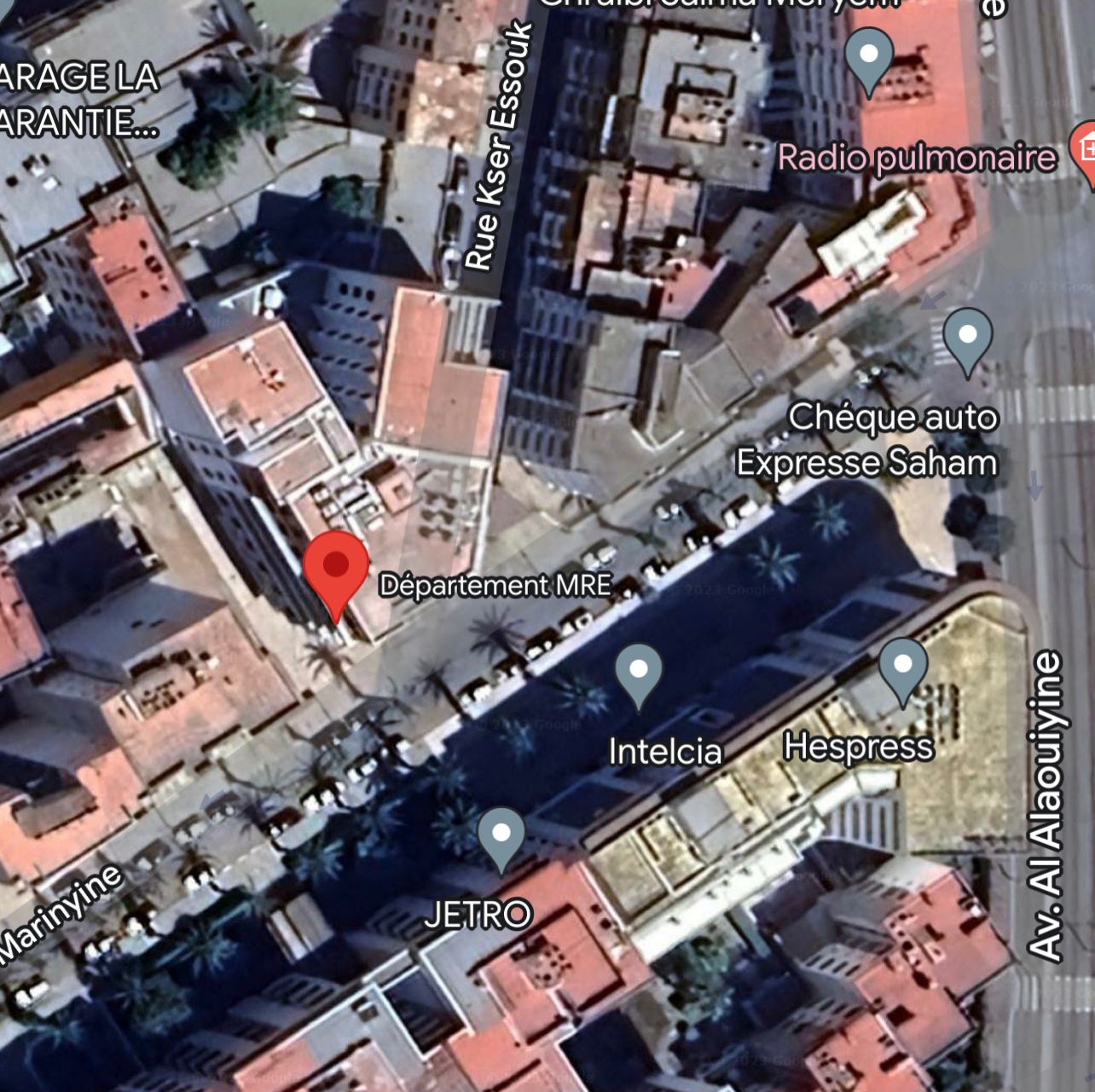
Contact information
Standard 1 : 212537776564
Standard 2 : 212537776588
Permanence (4.30 pm to 6.30 pm): +212 6 61 07 60 60
Fax : 212537770006
Address : Angle Rue Al Mariniyine et Rue Kssar Essouk, Hassan, Rabat


